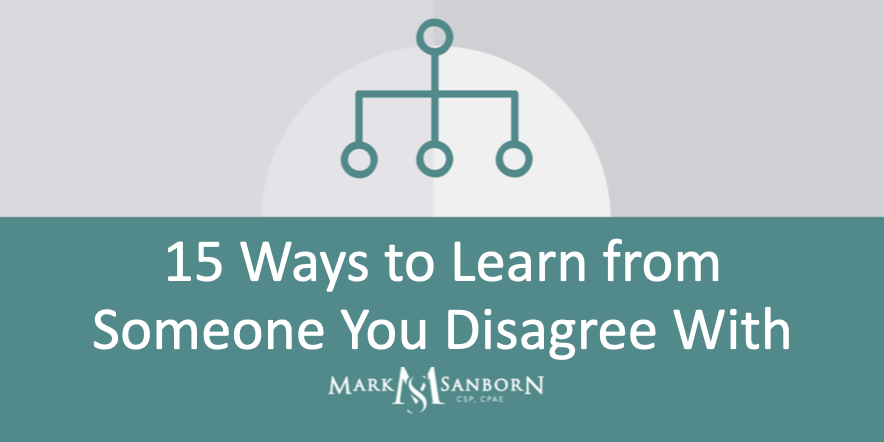The person next to me on the flight was slightly abrasive and borderline obnoxious. I had only tried to be polite and say “Hello” when I sat down but he took the opportunity to launch into a what’s-wrong-with-the-world tirade. Repeated attempts to work on my computer failed to dissuade my fellow traveler.
I admit I didn’t see this as an opportunity to learn anything. At best I was hoping to endure until this guy ran out of steam. But I got lucky when he said something particularly disagreeable. I didn’t argue. I just asked, “Why do you feel that way?”
He paused and considered his response. “That’s a good question. I hadn’t thought about it much.” With that, the conversation turned less oppressive.
The background and experiences he shared helped me understand why he was wound up. It didn’t make his point of view right or wrong, only different. When I took a genuine interest in what he was saying, he became less unpleasant and more relatable.
Learning from people I disagree with isn’t easy but it is almost always worthwhile. If you only converse with those who share the same point of view for the same reasons, you’ll feel validated and maybe vindicated but you won’t learn anything.
Choosing to learn from those who think differently challenges your thinking, identifies blind spots, broadens your perspective, creates connection and maybe builds a bridge to a relationship.
So how do mere mortals like us do that?
- Jordan Peterson says it well, “Assume that the person you are listening to might know something you don’t.”
- A close second: remember that nobody is always right or always wrong. We all have a mix of informed, uninformed and ill-informed opinions. Dropping the belief that you are always more right than others is an exercise in humility, and a reality check.
- Understand why someone thinks differently than you, not just what they think differently about. You’ll learn much more from why they feel a certain way than just what they disagree about.
- Treat the exchange like an inquiry, not an inquisition. When people feel challenged they usually get defensive.
- Look for what you agree about and use that as a foundation. Build from whatever you can and do agree about.
- Validate the other by expressing you hadn’t considered their point of view.
- Ask them to explain why they disagree with what you are saying.
- Appreciate that a difference of experience can easily create a difference of perspective.
- Acknowledge that people draw different conclusions from the same experiences.
- If you disagree, do it politely.
- Don’t just disagree, but explain why.
- Recap what you think the other person is saying to make sure you understand correctly.
- Admit when you don’t have enough information to know if something is true or not.
- Use the phrase, “In my experience.” Others can disagree with your conclusion but not what happened to you.
- Thank the person for expanding your perspective (if you are truly appreciative).
I hope you don’t find yourself next to someone like the person I described, but if you do, you now have some ideas on how to make the experience less unpleasant and maybe even learn something new.
Mark Sanborn is an award winning speaker and Leadership Expert in Residence at High Point University, the Premier Life Skills University. For more information about his work, visit www.marksanborn.com.
For a free assessment and information about The Classic Fred Factor online training and a unique opportunity to license the training, go to www.FredFactor.com.









Some of this reminded me of the following quote…
The difference between listening and pretending to listen, I discovered, is enormous. One is fluid, the other is rigid. One is alive, the other is stuffed. Eventually, I found a radical way of thinking about listening. Real listening is a willingness to let the other person change you. When I’m willing to let them change me, something happens between us that’s more interesting than a pair of dueling monologues.” ―Alan Alda, Never Have Your Dog Stuffed: And Other Things I’ve Learned
I think number 3 is the key to it all. And it can be implemented not only with people we disagree with. Learning what lays behind certain attitudes, behaviors or opinions opens up whole new worlds for us and teaches us so much about human nature.